|
"Chrysalis in Sunlight" is about two survivors of an alien invasion—one a veteran and one a civilian—who have to road trip from Denver to San Diego for treatment for a condition caused by exposure to alien microbes. I called this my "solarpunk Don Quixote" story while I was writing early drafts, though I don't know if it's actually the best example of solarpunk, and the homage to The War of the Worlds is probably more obvious than the Don Quixote connection. The story is ambiguously hopeful, and part of the plot revolves around a solar-powered electric car and a wind farm. There isn't an overt environmental theme, though maybe there are some metaphorical ones. It's not really the focus though, so much as the relationship between these two characters, and living with the aftermath of trauma.
I'm proud of this story, but I've been nervous about sharing it. The narrator has chronic pain, which is something I struggle with too, but rarely ever talk about, which makes this story feel a little more personal than most. I also used a trope you're not really supposed to use. I knew it, and I did it anyway, and while I tried to handle it with nuance and awareness, my intentions don't matter as much as how it is received. Below are some images from my Pinterest board for the story, with a few quotes from the story. Below that is a longer excerpt. See the whole Pinterest board here: www.pinterest.com/sarenaulibarri/chrysalis-in-sunlight/ When I was younger, Aunt Melissa used to show up twice a year, always stirring my otherwise mild-mannered family into a party, defeating my father in arm wrestling matches, challenging my grandfather to whiskey shots. She’d once driven all the way to Denver from the base in Missouri where she was stationed so she could beat the crap out of my ex-boyfriend who had given me a bruise.
"Chrysalis in Sunlight" was published by GigaNotoSaurus. You can read it online, or you can download a free ebook directly from their website. Find the story here: giganotosaurus.org/2018/08/01/chrysalis-in-sunlight/
0 Comments
Marian Womack was one of the amazing authors I had the privilege of spending six weeks with at the Clarion Fantasy and Science Fiction Writers Workshop in 2014. I first met her about a month before Clarion started, while my husband and I were visiting Spain. It was great to get off the regular tourist routes in Madrid, and also to get to know one of my classmates a bit better before the craziness of Clarion began. During the workshop, I was always impressed with her lush prose and gothic-influenced style, and I was thrilled to hear that a couple of her Clarion stories would be published in a collection—after making the rounds at places like Apex, Weird Fiction Review, and Year's Best Weird Fiction, of course. Just look at this gorgeous cover:
These stories explore place and landscape at different stages of decay, positioning them as fighting grounds for death and renewal. From dystopian Andalusia to Scotland or the Norfolk countryside, they bring together monstrous insects, ghostly lovers, soon-to-be extinct species, unexpected birds, and interstellar explorers, to form a coherent narrative about loss and absence. 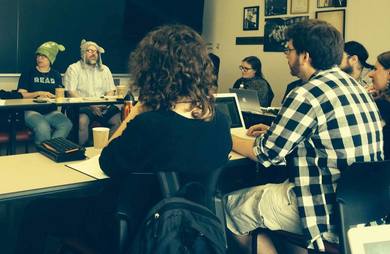
Marian's stories can often be considered climate fiction or eco-weird, and I think this cover perfectly captures the beauty and strangeness you'll find inside. I asked Marian to talk about her path to publication and her experience at the Clarion Workshop.
Sarena Ulibarri: In a nutshell, what was the path from manuscript to publication for LOST OBJECTS? Marian Womack: I was finding it a bit difficult to find venues where my writing could be a good fit. It wasn’t about getting rejections: I was lucky enough to get a story included in The Year’s Best Weird Fiction anthology series the first year I started publishing in English. But I was also getting a bit overwhelmed with the vast amount of possibility out there. In a way, I felt that the stories fitted together better as a group than on their own, so I decided I didn’t want to break them, and instead of trying to get them published in different venues, I put together the book I had had in mind from my first story in English, a coherent narrative with a meaning of its own. I am very fortunate that the reviews of the book so far have noticed and appreciated this. SU: What advice do you have for young writers who are struggling to get their first short stories published? MW: One of the hardest things to navigate for an author is to keep believing that you are not wasting your time, or other’s time; that what you do is valuable. You need to do that, you need to find the strength to invest hours and months and years in your writing without knowing if it will ever be read by others. Keeping that faith is paramount. We all go through periods of self-doubt, but it is important not to give up. SUL How has writing in English or living in the UK affected the way you tell stories? Are the stories you've written in Spanish different in tone or theme than the stories you've written in English? MW: This is an interesting question. In a way, that is partly the reason why I write weird and uncanny fiction. I spent many of my formative years in the UK, and that made me cultivate a sense of the strangeness in the world around me. I was, and still am in a way—depending on the circumstances—looked upon as an outsider. That sense of never really having fitted has been invaluable in helping me find the stories I want to tell. After so many years away from my native Andalusia, I also feel disconnected in some ways from the everyday when I am back there. It is a curious feeling, but again I can’t deny that it helps a writer to gain some distance, and to develop a different way of looking at the world that is particularly suited for writing weird, uncanny and speculative fiction. I have written and published many stories in Spanish, and I have also published two full-length books. And, ironically, some reviews said that my writing sounded as if it was ‘translated’ from English. I always took it as a compliment! I had been brought up on Dickens and Emily Bronte, long before I read Cervantes or Borges, so it made absolute perfect sense to me. SU: What’s your favorite memory from the Clarion Workshop? It’s so difficult to choose! Ann and Jeff VanderMeer in class, with silly hats on, making us feel more confident about our writing. Catherynne Valente declaring that the closing sentence of my story was the best sentence of the whole week (it was ‘Reader, I shot her’, I think!). The sense of being in a family, of having found a family, of like-minded people. SU: How many stories did you write at Clarion, and what became of them? MW: I was very productive, I think. I wrote five stories in total and a couple of flash fictions. Two of the stories were published shortly afterwards in Apex and Weird Fiction Review, and are reprinted in this collection. Another was published in the anthology EcoPunk! The story I considered my most successful of the workshop, the one I wrote in Catherynne Valente’s week, I have been developing into a full-length novel over the past four years. I am very fond of that story, very humbled that two of my favorite Clarion classmates, Nino Cipri and Kristen Rupenian, wrote fanfics based on it… SU: Do you have any readings or signings coming up? Where can readers find you, online or off? MW: I am a tentative and introverted user of twitter, where I am @beekeepermadrid. And my webpage is marianwomack.com. I try to keep the links up-to-date, but it is hard sometimes with a full-time job, a young family and two very demanding cats! I will be launching Lost Objects in FantasyCon in October. And I hope there will be some more readings in the near future. I am planning to travel to the US next year, fulfilling a long-held dream of attending ReaderCon at last. Who knows? Perhaps I will manage to do something while I am in the US as well. I am a very shy person, but I have never had problems reading my work. It is such a privilege to share your writing with others in real time, such a gift. After so many hours toiling on your own, sharing your writing and getting to know your readers is the nicest reward possible. I can only hope this will happen with Lost Objects. 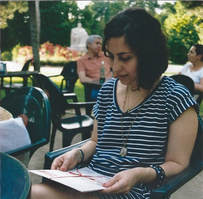
Marian Womack is a bilingual writer. She is the founder of indie press Nevsky Books and worked for nearly a decade in publishing before becoming a postgraduate researcher at the Anglia Ruskin Centre for Science Fiction and Fantasy. Her genre-bending fiction gained her a place in the Clarion Writers Workshop, and in the Creative Writing Master degree at Cambridge University. Marian’s writing is concerned with loss, nostalgia and nature, and her research explores the connections between the weird and ecological fiction. Other research interest are narrative theory, genre publishing and translation. Her fiction in English has appeared in LossLit, Weird Fiction Review, SuperSonic, Apex, or the anthologies The Year’s Best Weird Fiction, vol. 3 and EcoPunk! Speculative Tales of Radical Futures. She has also been translated into Italian and she has written for videogames. Lost Objects, a collection of tales about ghosts, loss and landscape, is now available from Luna Press Publishing.
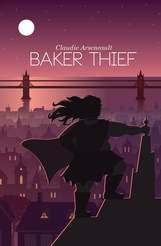
Claudie Arseneault was actually the first person to introduce me to the term solarpunk (a genre I've been rambling non-stop about ever since), through the call for submissions to her solarpunk dragons anthology Wings of Renewal. I've been following her career ever since, and it turns out she's just an all-around good person and awesome writer whom I'm glad to have encountered.
Today, I've invited Claudie onto my blog to talk about her new fantasy novel Baker Thief. Here's what the book is about: Adèle has only one goal: catch the purple-haired thief who broke into her home and stole her exocore, thus proving herself to her new police team. Little does she know, her thief is also the local baker. 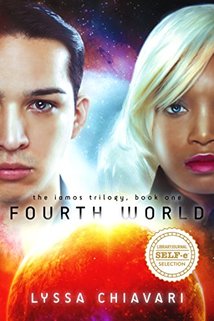
In a nutshell, what was the path from idea to publication for BAKER THIEF?
I started Baker Thief as a project that would be as fun and tropy as I wanted it to be, a story in which I’d allow myself to write Whatever I Wanted. The first glimpse of the project involved an investigator looking for a thief at a masked ball and a f/f romance—that changed quite a bit, but I was already aiming for The Good Tropes. I hadn’t even put the first word down before I knew one of the MCs would be bigender and aromantic, and that I didn’t want romance, but a queerplatonic relationship. These stories were near impossible to find (they still are hard, but it got better), and I felt drawn to them. Turns out that was because I was aromantic myself, but I didn’t know at the time. I also… jumped in with as much French as I wanted to, and to have my language in there quickly became incredibly meaningful and important to me. It took me quite a few drafts to get the ending right, then it made the typical rounds of dev editing through writer friends, sensitivity readers, beta readers, and copyediting. I started the first draft in February 2016, and here we are, about a year and a half later. What’s your typical writing routine? Do you write at a certain time of day, have word count goals, a particular playlist you listen to, etc.? It really depends on what part of the process I’m at. If I’m creating new words, typically for first drafts, I will write nearly every day and set word count goals (usually around 700-1,000 for weekdays, and 1,500-2,000 for weekends). As a writer, I do a lot better if my progress is constant. My full-time job makes this rather difficult, however, which means that I will write whenever I can. At least half of Baker Thief has been written on my cellphone during transit, and a good chunk of the other half was over my lunch break. I don’t have playlists as much as I have artists I’ll put on and listen on loop. And I don’t mean many of them. Most of my previous novels were written and edited on a background of Mumford and Sons. For Baker Thief, though, I stuck to artists from Québec, either Karkwa or Dumas. It felt right to listen to local music for a WIP that drew so intensely from my roots. What advice do you have for young writers who are struggling through the first draft of a fantasy novel? The first and most important for me is… don’t give up. Get to the end. Writing the end will teach you so much about the craft, about your story. Even if you end up trashing the story, it will be worthwhile (and you will have finished a draft!). That doesn’t mean you have to power through unquestioningly, though. Different writers need different things to get to the end. I handle unclear drafts very well, so I write start to finish without ever revising what’s behind, even if I decided halfway through I need to make a major change. I just take a note, act like the change is done, and move on. I know writers who couldn’t do that—no chance in hell—so they revise as they go, and their first drafts take longer but are a lot cleaner. So I guess my biggest piece of advice is experiment. Try things out! See what works for you, what allows you to progress and what just makes you hyper-anxious and unproductive. We all work differently, and sometimes our process even changes from one story to another. But if you find yourself never finishing anything? Find a way to get to that end; you’re limiting your growth otherwise. You’re very invested in the topic of asexual/aromantic representation. Do you remember the first time you saw this type of character represented well in fiction? What are some other published books that get it right? My first time was for a sex-repulsed asexual character, Nadin from Fourth World by Lyssa Chiavari. Nadin struggles a lot with her sex-repulsion and there are scenes throughout the novel that felt like someone had spied on my life. One in particular made me set the book down, because I needed time to take it all in. That was my first time, but by actively seeking representation over the course of the last 2-3 years, I’ve found so many more. I couldn’t even begin to list them all here. I recommend picking up the Chameleon Moon series, as it has an alloromantic asexual MC in the first book, and an aromantic asexual one in the second (and a whole lot more queer disabled diversity). If you’re more a contemporary person, then Let’s Talk About Love is about a biromantic asexual black girl. For aromantic characters, Darcie Little Badger has a wonderful short story, “Nkásht íí”, that is online for free and is all about friendship. I also thoroughly enjoyed A Promise Broken, from Lynn E. O’Connacht—a low-stakes fantasy of manners about a girl grieving and her aroace uncle. As I said, there are many more out there! You can check out Penny Stirling’s list of aromantic or asexual fiction that’s free online, Queer Books for Teens recommendations for aromantic and asexual, or even access my database which has a record of all the aro or ace fiction I could find, with tags and filters to make it easier to narrow down on what you really want. How have your own baking adventures informed the development of BAKER THIEF? Not in major ways. I was already well into the novel by the time I got really into baking, and I’d done my fair share of research before. It did change the way I described it—the details, basically. It’s just not the same until you have both of your hands in the dough and your lower back kinda hurts from all the kneading and you got flour over your clothes again because you keep forgetting an apron. Do you have any readings or signings coming up? Where can readers find you, online or off? I don’t have a lot of in-person stuff coming up, but I attend Can*Con every year, and I expect to be at Sirens Con this year, too! October is my convention month, haha. I am much easier to find online, however. I tweet at ClH2OArs and my website is at claudiearseneault.com. You can also support me more directly on Patreon. 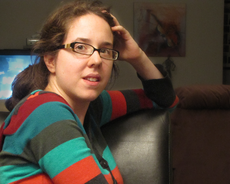
Claudie Arseneault is an asexual and aromantic spectrum writer hailfing from Quebec City. Her love for sprawling casts invariably turns her novels into multi-storylined wonders centered on aromantic and asexual characters. Her high fantasy series, City of Spires, started in February 2017. Her next book, Baker Thief, features a bigender aromantic baker and is full of delicious bread, French puns, and magic.
Claudie is a founding member of The Kraken Collective and is well-known for her involvement in solarpunk, her database of aro and ace characters in speculative fiction, and her unending love of squids. Find out more on her website!
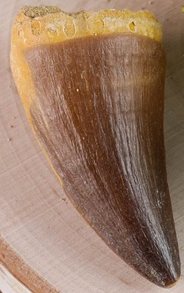 Like a lot of writers, I have many random notes for story ideas, most of which go nowhere or sit in a notebook for years before they actually become a story. "Under a Rock" started as one of those: I had the idea of an inexplicable gigantic tooth showing up in someone's backyard, and them charging admission to see it, a la "A Very Old Man With Enormous Wings." I plucked the idea out of my notebook after seeing an anthology call that had something to do with sharks and dinosaurs; I decided the giant tooth I'd imagined could be a cosmic-sized version of either. After looking into the anthology a bit more, I discovered it was actually a revenge market, something put together to get back at/make fun of some other editor or author. These happen from time to time as manifestations of publishing world drama—the recent Cocktales and The Cocky Cockers anthologies which were reacting to the CockyGate "trademark" fiasco are prime examples. But considering I didn't know or have any stake in whatever this shark-related drama was, I decided to just be grateful for the prompt that helped me get this idea on paper, and submit it elsewhere. I wrote this story just after I quit my "day job," which I'd been working at the same time I took over management of World Weaver Press, and I was feeling pretty stretched thin and out of touch with the rest of the world. This was one of the first stories I'd written in nearly a year. All of that exhaustion and disconnection got poured into this story, the sense that remarkable things were happening all around me and I couldn't even look up to witness them. I guess "Working Like a Dog" and "Brain Child" have similar themes—I'm just not a writer who deals well with the drudgery we so often need to pay our bills. The character in this story ends up at home from her overbearing job because she's suffering from a cold. It was a convenient way to take her out of her element, but it was also an idea I'd been wanting to explore for a while. Protagonists are usually healthy and ready to run, or else they're suffering from some sort of severe trauma or disease. So much of my life has been spent in sniffles, or in not-great-but-not-fatal health, so I gave my character a cold to see how she'd face this adventure with a tissue in her hand. Here's an excerpt of "Under a Rock": A giant dinosaur tooth sat smack in the middle of our un-mowed back lawn. Truly giant: a good eight feet tall, and twelve or more from root to tip. Read the rest of the story at Silver Blade Fantasy Magazine: www.silverblade.net/2018/06/under-a-rock/
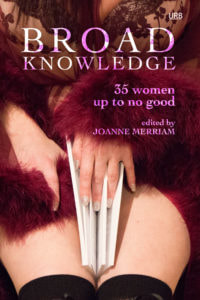 Joanne Merriam is the publisher of Upper Rubber Boot Books, a fantastic independent publisher who has brought you amazing books such as Sunvault: Stories of Solarpunk and Eco-Speculation and Choose Wisely: 35 Women Up to No Good. Now Joanne is running a Kickstarter to get two new anthologies off the ground. Broad Knowledge features a story by my good friend and Clarion classmate Vida Cruz, as well as stories by Wendy Nikel and Aimee Ogden, two authors I've been lucky enough to work with through World Weaver Press. Sharp and Sugar Tooth looks pretty awesome too, featuring some familiar names that always deliver amazing stories: Catherynne M. Valente, Alyssa Wong, Damien Angelica Walters, Caroline M. Yoachim, and many others. Check out my interview with Joanne Merriam, and then support the Kickstarter here: https://www.kickstarter.com/projects/1431077765/135809732?ref=489967&token=55a135c1 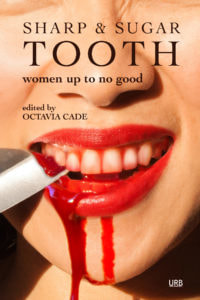 Sarena Ulibarri: Your description for these anthologies says they focus “on ‘bad’ women, and ‘good’ women who just haven’t been caught yet.” This reminds me of that famous quote about “well-behaved women rarely make history.” What made you want to publish stories about this kind of character? Joanne Merriam: That description is defining ‘good’ and ‘bad’ in reference to what we expect women to be, and I’m really fascinated by social expectations and how people structure their lives to adhere to or challenge them. The women in these anthologies appear to be doing everything ‘right’ while getting their own way, or decide they won’t be held back by others’ expectations, or, tragically, try to adhere to or challenge expectations and pay a terrible price for it. I hope that the breadth of stories will collectively show different ways of being, and open up a mental space for thinking about their own options for our readers (whether or not they’re women), in addition to entertaining them. SU: Can you give a couple of teasers about some of the stories we’ll find in BROAD KNOWLEDGE and SHARP & SUGAR TOOTH? JM: Broad Knowledge includes a scientific paper written by a researcher who contracts Innsmouth Fish-man Syndrome, an article for biblical scholars on a seraph’s visit to Earth, an in-depth ethical discussion for journalists covering a woman who has been quarantined on a military base so her ideas don’t spread to the general population, and a series of newspaper headlines and excerpts covering the invention of time travel—but the story that’s probably the most fun, and also possibly the darkest, is “Mary in the Looking Glass,” about the legendary horror figure Mary Whales, and her ex-lover. Sharp & Sugar Tooth features the ritual consumption of funerary meat, poison as a replacement for war, chefs who heal society one meal at a time, alien biomes which entirely consume their hosts, and women turning into chocolate, honey, pastry, fish food, and apple-bearing trees. I’m particularly taken with Jasmyne J. Harris’ “What the Bees Know About Discarded Girlish Organs,” in which part of romance is being eaten by your partner, and what happens when people split up before the process is completed. It’s really haunting. SU: You are editing BROAD KNOWLEDGE, while SHARP & SUGAR TOOTH is being edited by Octavia Cade. Did the two of you take different approaches to curating these books? JM: Yes, I think so. Octavia is quite brilliant! She struck me as very deliberate and careful and thoughtful about how she structured the book, both in selecting stories and in ordering them, to fit a kind of overall narrative arc. I took a more topic-oriented approach to ordering, and am perhaps not as smart, but I’m always saved by the amazing writers who send in their stories and make me look really good as an editor. SU: How do these two anthologies differ from CHOOSE WISELY, the first anthology you did of “Women Up to No Good”? JM: The main difference is the theme, of course: Choose Wisely is all about choices, while Broad Knowledge is about (you guessed it) knowledge, and Sharp & Sugar Tooth about food and consumption. They are also more diverse: Choose Wisely has more white authors, and more Americans, than either of these anthologies, and that’s reflected in the stories in these anthologies being more varied and reflecting more of our world. SU: You have some excellent writers lined up in these two anthologies. As an editor/anthologist, how do you go about reaching out to writers to ensure a diverse table of contents? JM: I use social media extensively to reach communities I’m not a part of. For calls for submissions, I post, where appropriate, on the FB groups Call For Submissions; Calls for Submissions (Poetry, Fiction, Art); Open Call: Science Fiction, Fantasy & Pulp Markets; Open Submission Calls for Horror/Paranormal/Mystery/SciFi Writers; Call For Submissions : QUILTBAG; Asian Science Fiction & Fantasy; Feminist Science Fiction; The State of Black Science Fiction; Women of Color Writers' Community; and WOMPO (Women's Poetry Listserv). I also tag writers who I’m interested in seeing work from, and post using hashtags like #diversesff on Twitter and Tumblr, and note the call for submissions in my emailed newsletter, which goes out 2-3 times/year. I’m also on Duotrope, so people who use that to search for markets will find our listings. When I’m selecting stories, I try to read blind by saving all of the stories under their titles and removing author identities. Of course, it’s never entirely blind because I can recognize some writers’ voices, but I make the attempt, which means that I have to address diversity in my submissions pool before I get to that largely-blind selection stage. Midway through my submissions period, I’ll go quickly through the submissions I’ve received to get a sense of who is submitting, just looking at names, and faces where gmail has included a photo, so I can see if I need to work harder to get the word out to certain communities. It’s necessarily an incomplete and uncertain process, so I try to err on the side of assuming I need to do more work. I try to do this at least a month and preferably longer before submissions close, so people have time to respond to renewed calls for submissions. SU: What's the process a story goes through between the time it is accepted and the time it is published in an Upper Rubber Boot Books anthology? JM: External editors have their own editorial processes, but for me there’s editing and proofreading with an outside proofreader, and then there’s all the stuff that goes into making the books themselves. So I go through any edits with the authors (reading closely, sending suggestions for changes), and possibly rewrites if they’re required, and then I figure out what order the stories should go in (usually I try a bunch of different orders until I settle on something that feels right), then create an html file of the stories, which will eventually be part of the ebook (I make the html file first then create the print book file from it so that any errors in the html will get caught). Then I do the formatting for the print files, then send those to the authors to double-check. Check out some excerpts from these anthologies below, and support the Kickstarter until June 30, 2018 by clicking here.
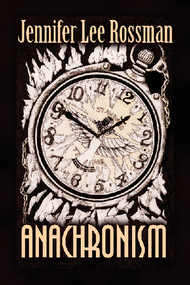
Full disclosure: Jennifer Lee Rossman is one of the authors I work with through World Weaver Press. We've been lucky enough to snag short stories from her for Glass and Gardens: Solarpunk Summers and Mrs. Claus: Not the Fairy Tale They Say, and she'll have a science fiction novel that is fun and heartbreaking in all the right ways coming out with us in early 2019.
Then again, she's got stories all over the place these days, so other publishers are clearly catching onto her talent! I invited her onto my blog to tell us a bit more about her awesome time travel novella, out now from Kristell Ink. Here's the description of Anachronism: It's the same old story: Time traveler meets girl, time traveler tells girl she's the future president, time traveler and girl go on a road trip to prevent a war...
Sarena Ulibarri: In a nutshell, what was the path from manuscript to publication for ANACHRONISM?
Jennifer Lee Rossman: When I wrote ANACHRONISM, I had never been published and, quite frankly, had no clue what I was doing as far as publishing was concerned. I wrote my query letter in about five minutes and proceeded to send it to every publisher that came up in my "sci-fi novella publishers" Google search (typos and all and, in one case, I managed to send two copies of my query letter in one email). By some miracle, it worked, and Kristell Ink's amazing editor Kate Coe has helped me polish the manuscript and guide me through the confusing world of proof copies and promotion. It's been a long process, but holding an actual book full of my words is the best feeling. SU: Without too many spoilers, how does time travel work in your novella? Are there limitations and constraints your time traveling characters have to work within? JLR: Moses doesn't like to give a lot of information about the intricacies of the science involved in time travel, but he does say that paradoxes are possible. There is nothing stopping you from going back in time and killing your ancestor, but it might make your ancestor pretty mad. SU: What books, authors, or films most influenced you when writing ANACHRONISM? JLR: The writing style has been compared to Douglas Adams, but that wasn't really a conscious decision. I was really inspired by roadtrip buddy movies. I love the dynamics (and hilarity) that arise when you stick two people in a car and force them to get along, and getting to add sci-fi and save-the-world elements made it really fun to write. SU: What’s your typical writing routine? Do you write at a certain time of day, have word count goals, a particular playlist you listen to, etc.? JLR: I write whenever I can, usually listening to 70s and 80s music. I try to write at least one page every time I'm on the computer, which sometimes results in short paragraphs and a lot of dialogue. SU: What advice do you have for young writers who are struggling through the first draft of a science fiction novel? JLR: Find other writers in your genre, whether that means a critique group at your library or a couple nerdy people on Twitter who will laugh along with you when you realize you accidentally stole half of your plot from Star Wars. SU: What are you working on now? And where can readers find you, online or off? JLR: I'm trying to rewrite a series of novellas I wrote when I was nineteen. They are... not well written, but I think they're fixable. And a bunch of people on Twitter have somehow convinced me to write a book about werewolves in wheelchairs. Called Chairwolves. I also have a novel, Jack Jetstark's Intergalactic Freakshow, coming out next year with World Weaver Press. The editor is a really nice lady named Sarena Ulibarri, and she definitely did not force me to say that. I blog at jenniferleerossman.blogspot.com and Tweet @JenLRossman, and you can find my stories in these anthologies on my Amazon page: amazon.com/author/jenniferleerossman About the Author
Jennifer Lee Rossman is a science fiction geek from Oneonta, New York. When she isn't writing, she cross stitches, watches Doctor Who, and threatens to run over people with her wheelchair. Her work has been featured in several anthologies and her novel, Jack Jetstark's Intergalactic Freakshow, will be published by World Weaver Press in 2019.
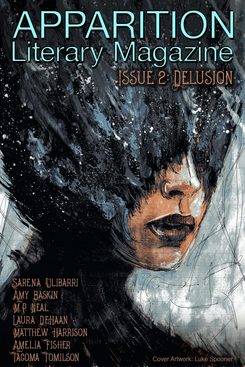
My fantasy story "The Ice Tree" is in the second issue of Apparition Literary Magazine! A hero-in-her-own-mind amateur sorceress sends a village into chaos while trying to prove herself, and vows to undo an ancient curse to make up for the mess she's made. Things do not go well.
I initially wrote this story more than ten years ago, and very little of the original survived when I re-wrote it in 2014 at the Clarion Workshop. It again became a different monster based on workshop feedback, and it took me a lot of drafts to get it just right. In the Clarion version (which unfortunately will be housed forever in the Clarion archives at the UCSD library), I was responding to feedback from a classmate who said my language tended to be dull. I was trying, desperately, to write more lyrical and beautiful sentences. The result just sounded…kind of silly. So I doubled down on that, and the character of Mirella developed naturally from that "extra" tone. She's not a likable character—she's not meant to be—but I hope you enjoy her anyway. It's much easier to get away with this kind of a male character—I drew inspiration from Zap Brannigan, Gilderoy Lockhart, and Ash Williams, but Mirella is definitely her own brand of delusional egotist. Here's a brief excerpt, a bit of backstory about how Mirella developed the magic she's now abusing: Although spell-casting was a rare skill these days, there was nothing special about Mirella’s proclaimed title of “holder of an Izka stone.” The original Izka stones were massive, and had been split and scattered throughout the land. Mirella had discovered hers in the decorations on the wardrobe in her childhood bedroom when an unlikely coincidence of gestures had accidentally created a spell that transformed her bed into a rosebush, thorns and all. She’d pried the stone out of the wardrobe and messed around with it on her own for a while, but after she’d turned her sister’s hair to wax—a fine improvement, Mirella thought, but not what she had been going for—she took a two-week class with some old hag in an upstairs apartment to learn how to properly use it.
If you'd like to see the Pinterest board I made for the story, you can check it out here. And you can pick up a copy of the issue on Kindle at the link below, or read the story online at the Apparition Lit website.
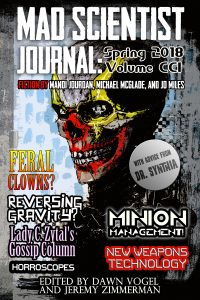
My story, "Cocktails at the Mad Scientist's House" is in the Spring 2018 issue of Mad Scientist Journal, out now! Makes sense that this is where this story would end up, doesn't it? I didn't initially write the story with Mad Scientist Journal in mind, but it turned out to be a perfect fit.
My story is classified as an "essay," but it's still definitely fiction (I should hope that would be fairly obvious). One of the quirky, fun things about Mad Scientist Journal is that they publish these first person "essays" as though the character were a real person who just dictated their experience to the author. That's why below, you'll see the byline says "An essay by Tina Eikenboom, as provided by Sarena Ulibarri." I even had to come up with a brief bio for my character. Here's what I said about her: Tina Eikenboom is a real nobody. You've never heard of her, or met her. Unless maybe you went to high school with her. Or community college. If you ever lived next door, you might know her as that girl who plays music too loud. Tina's not her real name, but it does start with a T, and if she has too much to drink, she might accidentally tell you what it is.
I'm grateful to Dawn Vogel and Jeremy Zimmerman for giving Tina's frantic story of murder and mad science a home in this issue. I was also thrilled to recognize a couple of other names in the table of contents, including Holly Schofield, who has a story forthcoming in my Glass and Gardens: Solarpunk Summers anthology. This story of hers is a lot darker than the solarpunk one, of course. Those feral clowns mentioned on the cover? Yeah, that's Holly's story. (And it's awesome.)
I hope you'll check out a copy, and let me know what you think of the stories!
I edited a solarpunk anthology! It's now a real live thing. You can pre-order it now, and it will be loosed upon the world on June 5, 2018. Over the three-month submission window last year, I received 62 submissions from authors all over the world. I put 25 of those stories on the shortlist and read them again, then sent 20 of them to one of the other World Weaver Press staff for a second opinion. I ended up with a table of contents of 17 stories that I am thoroughly psyched about, and a bunch of authors who have been wonderful to work with.
Wondering what it means to "edit" an anthology? See my post about that here. Wondering what "solarpunk" is? Check out an article about it here. Solarpunk is an emerging subgenre, though it's situated within a larger tradition of "climate fiction" that is well established by now. My hope is that the stories within my anthology will help to solidify some of the tropes that set solarpunk apart from its more dystopian and apocalyptic cousins, and also inspire more writers to approach science fiction from an optimistic angle. And more than anything, I just hope these stories will make readers smile the way I did when I found each of them in the slush pile. Okay, ready for the cover? (I designed that, too.) Solarpunk is a type of optimistic science fiction that imagines a future founded on renewable energies. The seventeen stories in this volume are not dull utopias—they grapple with real issues such as the future and ethics of our food sources, the connection between technology and nature, and the interpersonal conflicts that arise no matter how peaceful the world is. In these pages you’ll find a guerilla art installation in Milan, a murder mystery set in a weather manipulation facility, and a world where you are judged by the glow of your solar nanite implants. From an opal mine in Australia to the seed vault at Svalbard, from a wheat farm in Kansas to a crocodile ranch in Malaysia, these are stories of adaptation, ingenuity, and optimism for the future of our world and others. For readers who are tired of dystopias and apocalypses, these visions of a brighter future will be a breath of fresh air.  New solarpunk story markets are popping up all the time. See my first two lists of places to send your solarpunk stories here and here—some of those deadlines have expired, but others are still coming up, or are ongoing. Below are ten more magazines and contests that are interested in publishing solarpunk stories. They're organized with the earliest deadlines listed first. Know of a solarpunk fiction market I missed? Please leave a comment! FiyahMagazine, Themed Issue Submission Window: January 1, 2018 – January 31, 2018 Length: 2,000 to 15,000 words Payment: (2,000 – 7,000 words): $150 USD; (<15,000 words): $300 USD Description: Big Mama Nature issue: Everyone knows that you need to respect Mama. We’re looking for stories of Nature and her swift backhand when folks get out of line. Give us your stories of ecological wastelands, futures full of solar powered punks, or natural disasters. Climate fiction is the name of the game, and Big Mama don’t play. Full Guidelines: http://www.fiyahlitmag.com/submissions/ Note: Submissions limited to stories by and about people of the African Diaspora. Bikes in Space 6 Published by Microcosm Publishing Submission Window: closes February 1, 2018 Length: 500 to 8,000 words Payment: based on Kickstarter, no less than $30 per story Description: The theme for this issue is: Dragons. Stories can be in any science fiction or fantasy – ish genre: high fantasy, hard SF, space opera, fairy tales, solarpunk, spec fic, slipstream… anything but fanfic. Dragons can be literal or metaphorical, from a specific cultural tradition or entirely of your own invention. Surprise me! All stories must contain bicycles—the story doesn’t need to be about bicycling, but this element must be central enough that removing it would change the story significantly. Same goes with feminism. The story doesn’t have to be about feminism, but it does need to break from tired old gender stereotypes. Full Guidelines: http://takingthelane.com/2017/10/25/call-for-submissions-bikes-in-space-6-dragons/ Electric AthenaeumPublished by The Anglia Ruskin Centre for Science Fiction and Fantasy Submission Window: closes February 15, 2018 Length: 3,000 to 10,000 words Payment: 50GBP per story Description: For Future Generations (theme): Generation starships establishing new colonies. The Svalbard Global Seed Vault. Driving back the dark to protect your children. For this issue of Electric Athenaeum, we are seeking genre stories that focus on the issues surounding planning for future generations. We are particularly interested in stories featuring new visions/interpretations of generation starships, the care of fragile ecosystems, and dramatic explorations of balancing the rights of future generations versus the needs of the present. Full Guidelines: http://csff-anglia.co.uk/ea/subs/ The Moon MagazineMagazine, Themed Issue Submission Window: closes February 20, 2018 Length: up to 5,000 words Payment: exposure only Description: Permaculture issue: The MOON welcomes submissions of original short stories, poetry, essays, and memoirs of any length (generally less than 5,000 words), as well as photography, artwork, and even video, addressing the following themes. (For 2018 we’re on a mission: what can “save” the world?) March 2018, “Return to our roots: The Permaculture plan for saving the world,” DEADLINE: February 20, 2018 Full Guidelines: http://moonmagazine.org/submission-guideline/ Everything Change Contest, Winners Published by Imagination and Climate Futures Initiative at Arizona State University Submission Window: closes February 28, 2018 Length: up to 5000 words Payment: $1,000 grand prize. Nine finalists will receive $50 each Description: In the wake of Earth’s hottest year on record, the effects of climate change are more apparent than ever. But how do we come to grips with the consequences on the ground, for actual people in specific places? Paolo Bacigalupi, renowned for his climate fiction novels and short stories, believes the answer lies in story: “Fiction has this superpower of creating empathy in people for alien experiences. You can live inside of the skin of a person who is utterly unlike you.” If our political responses and our empathy for people besieged by the consequences of climate change fall short, perhaps we need new stories to help us imagine possible futures shaped by climate change and our reactions to it. Full Guidelines: https://climateimagination.asu.edu/clificontest/ Note: Last year's winning stories are available as an ebook or a PDF. Download it here. The first story, “Sunshine State” by Adam Flynn and Andrew Dana Hudson is very much solarpunk. About Place JournalMagazine, Themed Issue Submission Window: January 1 to March 1, 2018 Length: up to 4,000 words Payment: exposure only Description: Rewilding Issue: Is it also possible for humans to rewild themselves? What would this look like? When humans deny themselves or are restricted from opportunities for deep immersion in nature, or access to their ancestral places, what has been lost? Journalist Richard Louv has suggested that this deprivation is a “nature-deficit disorder” that afflicts many humans—particularly those of us dwelling in urban, high-tech surroundings or housing projects planted on landscapes of pavement under orange glowing lights that so obscure the night sky that we might come to think of the stars and the planets as rumored bodies floating somewhere up above. For some of us trying to get “back to the garden,” this rewilding may look like resistance. Urban families who seed unsanctioned gardens in vacant lots are often reviled by developers and city leaders, who respond with bulldozers and concrete mixers. When Latinx neighbors install backyard chicken coops, the HOA squawks about it, but when white hipsters make it cool, restrictive city ordinances are rescinded. Houston politicians have tried to ban piñatas from city parks, claiming they often end up as litter—sending a clear message that Mexican families are not welcomed in public green spaces. When Black artists in Dallas are commissioned to create signs for a city park and their proposed designs memorialize a history of racial violence in that public space, their project is cancelled. For this issue of About Place, you’re invited to describe the “letting go” spaces of rewilding—the critical habitats where and when our human expressions and behaviors might become unfettered—in explorations that are less mediated, colonized, or civilized. And what could such explorations possibly serve to resemble, reify, or reject? Full Guidelines: http://aboutplacejournal.org/submissions/ Force of NaturePublished by Dark Regions Press Submission Window: closes March 31, 2018 Length: 2500 to 10 000 words Payment: 7c p/w up to 7K – 5c p/w for stories longer than 7K Description: Though some among us have realised the importance of sustainable living, in the broad sense of everyday life, we still demand too much. Our capitalist dispositions have driven a wedge between ourselves and nature; we have become transfixed by the shine of chrome, the luxury of packaged lives, no longer seemingly aware of the solid earth beneath our feet. At an ever-advancing tipping point, humanity persists in its war against the natural world. Running a trail of extinction and cutting down vast swathes of oxygen-producing forests, we breed at an alarming pace, overpopulating a planet we seem hell-bent on reigning in – but at what cost? It seems we’re playing a cruel joke on the system that sparked our existence, and which has sustained us ever since. Or could the joke be on us? Force of Nature (working title) will be an anthology of original short fiction that explores the physical and metaphysical boundaries between humanity and the natural world. Full Guidelines: lynnejamneckdiaries.blogspot.ca/2017/12/submission-guidelines-weird-nature.html Stories of the Nature of Cities 2099Contest, Stories Published by Publication Studios / Guelph Submission Window: closes April 15, 2018 Length: up to 1,000 words Payment: $3,000. $1,500, $500 prizes, honorable mentions published with no payment Description: What are the stories of people and nature in cities in 2099? What will cities be like to live in? Are they lush and green, verdant and biodiverse? What will cities look like; be made of? How will they be designed and powered? Will they be tall, short, dense, under ground or under water? What of public spaces? Social organization? Mobility? Government? Sustainability and food? Wildlife? Climate change and resilience? Poverty, consumption, wealth, and justice? How will we interact and relate to one another and the natural world? What sort of stories can we tell about our communities and the spaces that shape will them? Full Guidelines: http://www.storiesofthenatureofcities.org/ Third FlatironThemed Magazine Submission Window: June 15 - July 15, 2018 Length: 1,500 and 3,000 words Payment: 6¢ per word Description: Terra, Tara, Terror: Whether the setting is a cabin in the woods (Terra), Fae (Tara), or spaceship Nostromo (Terror), take us there and spin your adventure. For a bit of mood whiplash, we'd like a mixture of dark and bright stories. Examples: Obsession with odd artifacts (like Roadside Picnic's golden sphere?), alternate histories, paranormal romance (no erotica, please, we're PG-13). Full Guidelines: http://www.thirdflatiron.com/liveSite/ Dancing Star Press Small Press Publisher
Submission Window: April 1 – June 30 and October 1 – December 31 Length: 17,500 and 40,000 words Payment: Royalties, not specified Description: Dancing Star Press is seeking submissions of speculative fiction novellas. Space operas, solar punk, dark fantasy, and urban fantasy. Hard science fiction with an emphasis on biology or chemistry rather than physics. Fantasy based on non-Western cultures. Optimistic futurism. Polar Tesla pop and soft science fiction. Full Guidelines: http://www.dancingstarpress.com/submissions/ |
Archives
January 2024
Categories
All
|
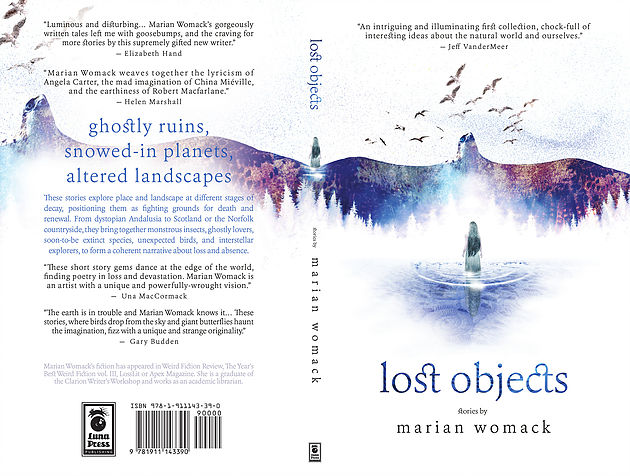
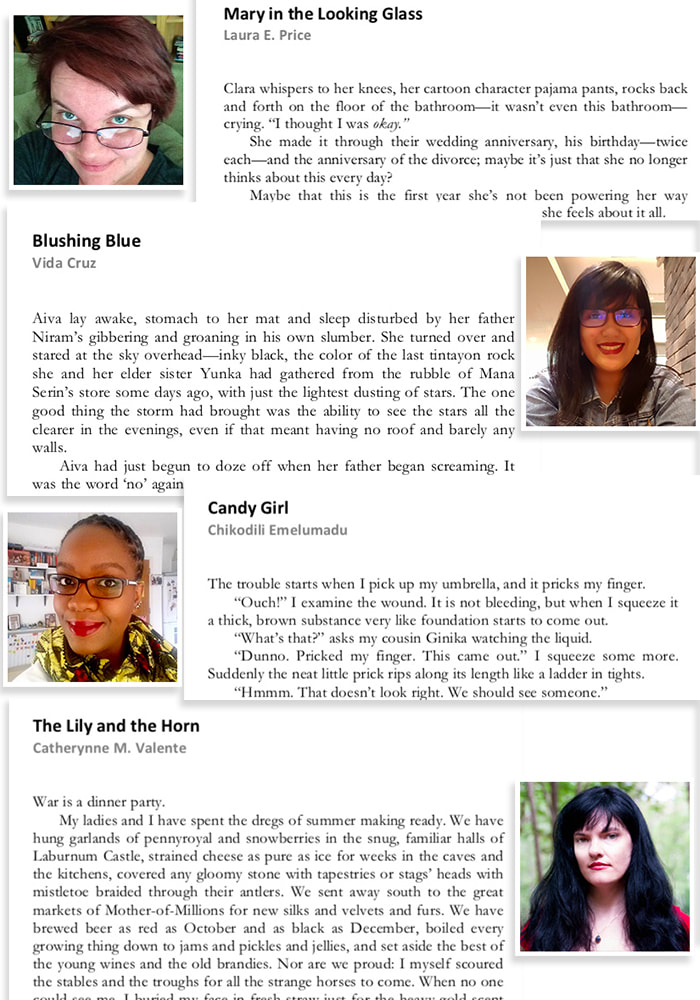
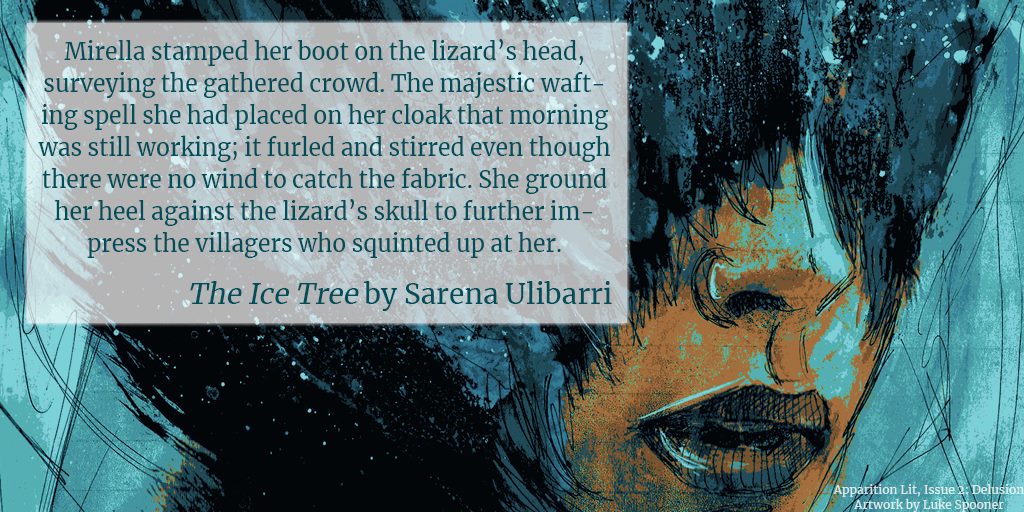
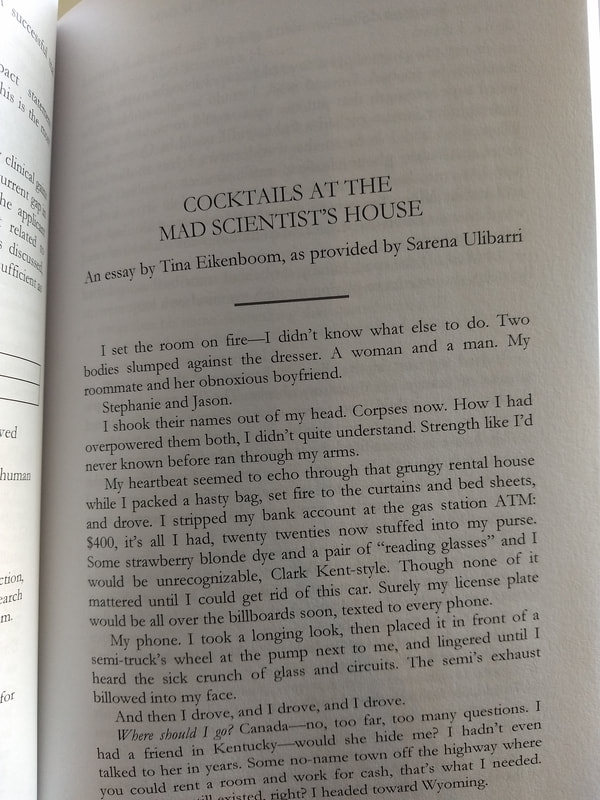
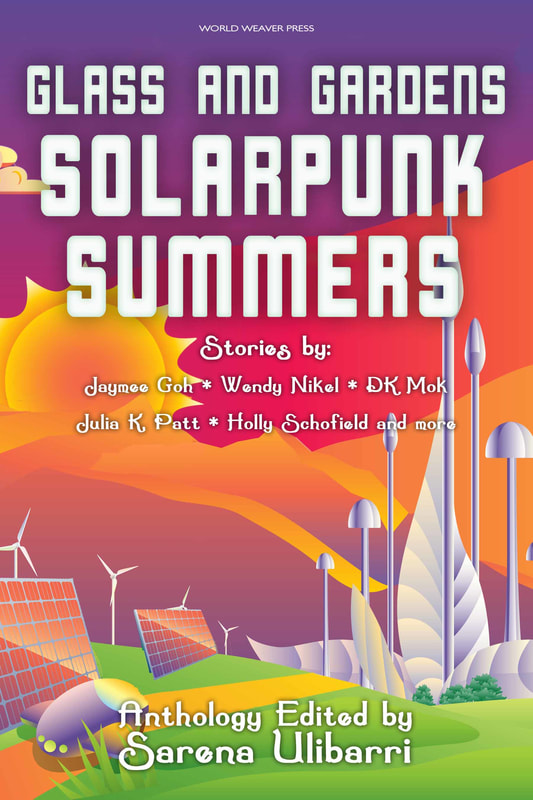

 RSS Feed
RSS Feed